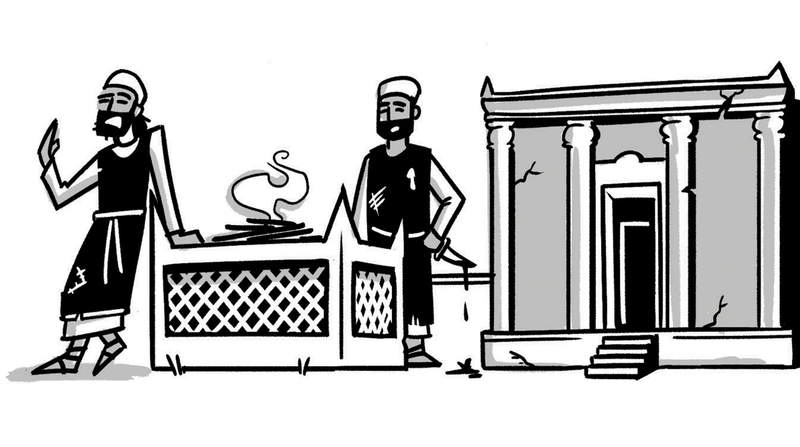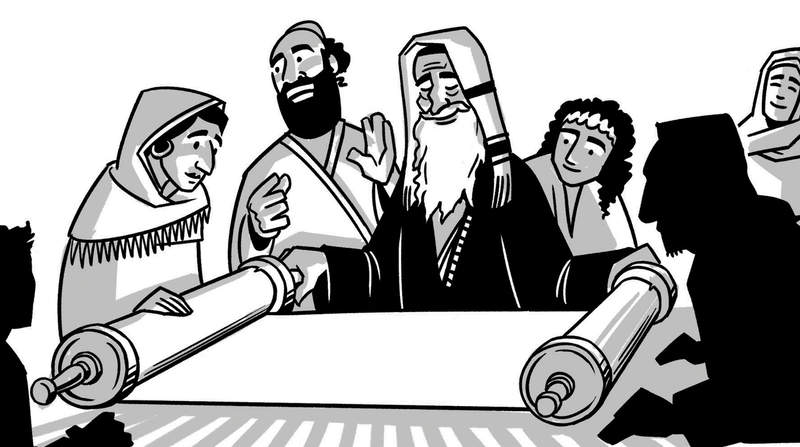The Book of Malachi
About

One important aspect of the ancient TaNaK order of the Hebrew Bible is that the 12 prophetic works of Hosea through Malachi, sometimes referred to as the Minor Prophets, were designed as a single book called The Twelve. Malachi is the final book of The Twelve.
Malachi lived about 100 years after the Israelites had returned from Babylonian exile, and his message was directed to the people who had been living in Jerusalem for some time. The temple had been rebuilt a while ago, but recall the stories in Ezra-Nehemiah—things were not going well. When the first Israelites had returned from exile, hopes were high. They would rebuild their lives and the temple, and all the great promises of the prophets would come true. The messiah would come and set up God’s Kingdom over a unified Israel and over the other nations, bringing peace and justice.
Unfortunately, none of that had happened, and the Israelites who repopulated the city proved to be just as unfaithful to God as their ancestors. Jerusalem became a place of poverty and injustice once again, and in the book of Malachi, we find out just how corrupt this new generation had become.
The book is designed as a series of disputes or arguments. Most sections begin with God saying something or making a claim or an accusation. This is followed by Israel disagreeing or questioning God’s statement. Finally, God will respond and offer the last word. This pattern repeats itself six times. In the first three disputes (chs. 1-2), God exposes Israel’s corruption, while in the final three (ch. 3), he confronts their corruption. The overall impression you get from reading these disputes is that the exile didn’t fundamentally change anything in the people. Their hearts are as hard as ever.
Who Wrote the Book of Malachi?
Context
Key Themes
- God’s love for Israel
- Israel’s idolatry and unfaithfulness
- God’s divine gift of a future deliverer
Structure
Malachi 1-2: Exposing Israel’s Corruption
The first dispute (Mal. 1:2-5) starts as God says that he still loves his covenant people Israel despite their failures. Israel rudely says, “How have you shown us love?” God reminds them of how he graciously chose the family of Jacob, their ancestor, to become the carrier of God’s covenant promises instead of his brother Esau and his family, who eventually came to ruin (Gen. 25-27; Obadiah). Right from the start in this first dispute, Israel is exposed as suspicious, doubting God’s faithfulness and love.
The second dispute (Mal. 1:6-2:9) exposes a problem with Israel’s second temple. God accuses the people of despising him and defiling the temple (Mal. 1:6-7), while the people fire back, “How have we despised you?” God responds by focusing on how the people are bringing shameful offerings of sick, blemished animals. It shows that they don’t value or honor their God. And the priests are part of the problem too, because they not only tolerate but also participate in these corrupt forms of worship. From top to bottom, God’s people have proven themselves totally faithless.

In the third dispute (Mal. 2:10-16), God accuses the Israelite men of treachery against him and their wives (Mal. 2:10; Mal. 2:14). Of course they deny this, so God exposes the toxic combination of idolatry and divorce that was taking place. Israelite men were marrying non-Israelites and adopting the worship of their wives’ ancestral gods in their homes (Neh. 13). Malachi then connects this to a wave of men divorcing their wives without any good reason. The worst part is that the people seem fine with all of this. Malachi says no! This is a betrayal of their covenant with God.
Malachi 3: Confronting Israel’s Rebellion
The book of Malachi transitions into the second set of disputes, which confront Israel’s rebellion. The fourth dispute (Mal. 2:17-3:5) begins with the Israelites accusing God of neglect, saying, “Where is the God of justice?” They see injustice and corruption abound, but God seems to do nothing. God responds by saying that he will send a messenger who will prepare the people for his personal return on the Day of the Lord. It will come like a fire to purify his people and to remove idolatry, sexual immorality, and social injustice, so that only the faithful remnant is left to become his people.
In the fifth dispute (Mal. 3:6-12), God calls the people to turn back to him, to which the people say, “How?!” God confronts their selfishness and reminds them that they stopped offering a tithe from their income to the temple. Now, the word “tithe” just means “one-tenth,” which was supposed to be the amount of their income that was annually donated to support the temple and its priests, a practice that was laid out in the Torah in Leviticus 27:30 and Deuteronomy 12:6. However, we know from Malachi and Nehemiah 13:10-11 that the people had neglected this responsibility, and so the temple fell into disrepair. God confronts them, saying that while he wants to bless them with abundance, he will only do so if they are faithful.
In the final dispute (Mal. 3:13-18), the people accuse God, saying that it is pointless to serve him. They observe wicked, prideful people succeeding in life all the time, but God seems to do nothing about it. The response, for the first time in the book, is not a speech from God, but a short story (Mal. 3:16-18). It’s about the faithful remnant in Israel, who still fear the Lord and love to talk together about how to honor and serve him. God orders that a “scroll of remembrance” be written for them, so that they can read the scroll to better remember God’s character and promises. Malachi is reflecting here on the divine gift of the Scriptures. They point us to the past to remember what God has done, in order to inspire faithfulness and hope for the future.

Malachi 4: Day of the Lord and Conclusion
This leads to the conclusion of the book in Malachi 4:1-3. This passage picks up and further develops the imagery of the fourth dispute about the coming Day of the Lord. God has appointed that day of purifying judgment to consume the wicked from among his people, but, as this conclusion adds, there is still a future for the remnant. For them, the Day of the Lord isn’t a threat but is instead a cause for joy. It will be like the rays of the rising sun, bringing life and healing as well as hope for the future.
Malachi’s disputes come to a close, but there’s actually still a bit more to the book. The final three verses (Mal. 4:4-6) are not part of the disputes, and they function more like a concluding appendix that brings closure not only to Malachi but to the whole collection of the Torah and the Prophets.
First, the reader is called to “remember the law (or Torah) of my servant Moses” (Mal. 4:4), which recalls the story and laws of the covenant in the first five books of the Bible. Next, we hear this summary of the books of the Prophets: “I will send the prophet Elijah before the Day of the Lord, who will restore the hearts of God’s people” (Mal. 4:5-6).
This conclusion, first of all, summarizes the Torah and the Prophets as a unified story that points to the future. Israel was redeemed by God, but then they betrayed him with their rebellion and hard hearts, breaking the laws of the Torah. The Scriptures anticipate a future day when God will send a new Moses and a new Elijah, who will restore God’s people and heal their hard hearts (Deut. 30; Jer. 31; Ezek. 36).
This concluding appendix also presents the Torah and prophetic Scriptures as a divine gift to read, ponder, and pray over. They tell the truth about the human condition as well as our selfishness and sin, but they also announce God’s promise that he will one day send a messenger and show up personally to confront evil, restore his people, and bring his healing justice.
That future hope is what Malachi, the Torah, and the Prophets are all about.